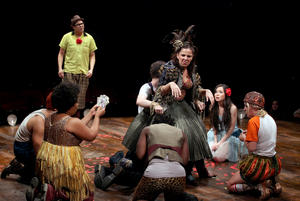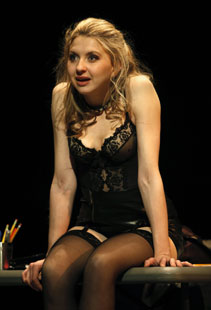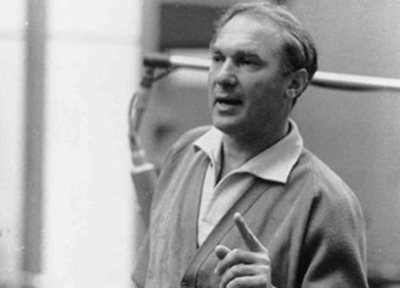The latest episode of Freakonomics Radio, hosted by Stephen Dubner, is called “Boo…Who?” It’s a wide-ranging discussion of the phenomenon of booing, and seeing as how I held forth on the subject in a 2009 Wall Street Journal “Sightings” column, I was asked to participate.
If you’re curious, go here to download the podcast version.
Archives for 2011
TT: In memoriam
The New Dublin Voices sing Thomas Tomkins’ “When David heard”:
TT: That wild and crazy Messiah
In today’s Wall Street Journal I report on three shows, the Broadway revival of Godspell, the Public Theater production of King Lear, and the Broadway transfer of David Ives’ Venus in Fur. My thoughts about the first of these shows are–shall we say–countercultural. Here’s an excerpt.
* * *
 Skeptics be damned: “Godspell” is a joyously noisy romp that goes off like an extra-long string of firecrackers. It took 34 years for Stephen Schwartz’s once-ubiquitous rock musical, in which the gospel according to St. Matthew is enacted as a circus-like vaudeville turn, to make it back to Broadway, and by all rights the results should have been dated beyond hope of resuscitation. But Daniel Goldstein, the director of this revival, has blown all the dust off “Godspell,” and the result is not a stale exercise in boomer nostalgia à la “Hair” but a fizzy, family-friendly show that deserves to run…well, forever….
Skeptics be damned: “Godspell” is a joyously noisy romp that goes off like an extra-long string of firecrackers. It took 34 years for Stephen Schwartz’s once-ubiquitous rock musical, in which the gospel according to St. Matthew is enacted as a circus-like vaudeville turn, to make it back to Broadway, and by all rights the results should have been dated beyond hope of resuscitation. But Daniel Goldstein, the director of this revival, has blown all the dust off “Godspell,” and the result is not a stale exercise in boomer nostalgia à la “Hair” but a fizzy, family-friendly show that deserves to run…well, forever….
In a way, the most surprising thing about “Godspell” is that Mr. Schwartz’s score still sounds so fresh, partly because of Michael Holland’s up-to-the-second arrangements (and the high-energy playing of the seven-piece pit band) but mostly because it was so well written in the first place. You’ll remember “Day by Day” if you were around in the ’70s, but the other songs are, if anything, even catchier. That said, I doubt this revival would be half so effective had Messrs. Schwartz and Goldstein not spruced up the show, inserting pop-culture references that move John-Michael Tebelak’s original book into the age of iPads, hip-hop and Occupy Wall Street with little sense of strain. It helps, too, that everyone in the cast is funny, especially George Salazar, and that nearly everyone sings well…
Sam Waterston, the erstwhile star of “Law & Order,” is–or can be–an accomplished stage actor. He was impressive as the star of Long Wharf Theatre’s 2005 revival of Tom Stoppard’s “Travesties,” less so as Polonius in the Public Theater’s 2008 Shakespeare in the Park “Hamlet.” That he should now be taking on one of the theater’s most demanding parts, the title role of “King Lear,” is an entirely different sort of challenge, and Mr. Waterston’s fussy, doddering performance, in which he clearly means to give us a Lear on the verge of senility, is dramatically monochromatic and vocally inadequate. Indeed, he sounded so hoarse on Sunday as to suggest that he was on the verge of succumbing to laryngitis. Could it be that a decade and a half of small-screen acting has dulled Mr. Waterston’s ability to fill a theater with the sound of his voice? Whatever the reason, his Lear is a well-meant failure….
 If it’s possible to become a full-fledged stage star in an Off-Broadway show, then Nina Arianda did it in the 2010 premiere of David Ives’ “Venus in Fur,” a dazzlingly serious two-person comedy about a ditzy actress who auditions for a new play about a masochistic relationship and ends up seducing the self-important author-director (Hugh Dancy). “Venus in Fur” has now transferred to Broadway’s Samuel J. Friedman Theatre, where the gleefully sexy Ms. Arianda comes across every bit as powerfully as she did in the Classic Stage Company’s smallish performance space….
If it’s possible to become a full-fledged stage star in an Off-Broadway show, then Nina Arianda did it in the 2010 premiere of David Ives’ “Venus in Fur,” a dazzlingly serious two-person comedy about a ditzy actress who auditions for a new play about a masochistic relationship and ends up seducing the self-important author-director (Hugh Dancy). “Venus in Fur” has now transferred to Broadway’s Samuel J. Friedman Theatre, where the gleefully sexy Ms. Arianda comes across every bit as powerfully as she did in the Classic Stage Company’s smallish performance space….
* * *
Read the whole thing here.
TT: The forgotten man of jazz
My “Sightings” column in today’s Wall Street Journal is occasioned by the publication of the first biography of Norman Granz, Tad Hershorn’s Norman Granz: The Man Who Used Jazz for Justice. Here’s an excerpt.
* * *
According to Percy Shelley, poets–and, by extension, artists of all kinds–are “the unacknowledged legislators of the world.” Yet the people who make it possible for artists to make art typically get even less acknowledgment. Agents, managers, editors, patrons, producers, art dealers, even the odd critic: All play pivotal roles in the creation and dissemination of art, but few are known by name save to insiders, and fewer still receive the posthumous credit that they deserve. Yes, Joe Orton’s emergence as a major playwright was one of the great theatrical success stories of the ’60s–but the author of “What the Butler Saw” might never have gotten anywhere if Peggy Ramsay, Orton’s agent, hadn’t taken him on. Yes, Jasper Johns is now universally acknowledged as a key figure in the history of postwar American art–but it was Leo Castelli’s decision to show Johns’ work at his gallery in 1958 that set the painter on the path to fame.
 Nowadays the name of Norman Granz, who died in 2001, is known only to gray-headed jazz buffs, but there’s a fair chance that you own at least one of the hundreds of albums that he produced for Verve, the record label that he founded in 1956. The “songbook” albums in which Ella Fitzgerald recorded her interpretations of the collected works of such classic songwriters as Harold Arlen, George Gershwin and Johnny Mercer were Granz’s idea. So were the 14 albums taped at a series of marathon sessions in 1954 and 1955 in which Art Tatum, the greatest of all jazz pianists, recorded 120 stupendously virtuosic solo performances–nearly the whole of his working repertoire. So was Jazz at the Philharmonic, the now-legendary series of concert tours in which Granz brought together such illustrious artists as Fitzgerald, Duke Ellington, Stan Getz, Coleman Hawkins, Charlie Parker, Oscar Peterson, Buddy Rich and Lester Young….
Nowadays the name of Norman Granz, who died in 2001, is known only to gray-headed jazz buffs, but there’s a fair chance that you own at least one of the hundreds of albums that he produced for Verve, the record label that he founded in 1956. The “songbook” albums in which Ella Fitzgerald recorded her interpretations of the collected works of such classic songwriters as Harold Arlen, George Gershwin and Johnny Mercer were Granz’s idea. So were the 14 albums taped at a series of marathon sessions in 1954 and 1955 in which Art Tatum, the greatest of all jazz pianists, recorded 120 stupendously virtuosic solo performances–nearly the whole of his working repertoire. So was Jazz at the Philharmonic, the now-legendary series of concert tours in which Granz brought together such illustrious artists as Fitzgerald, Duke Ellington, Stan Getz, Coleman Hawkins, Charlie Parker, Oscar Peterson, Buddy Rich and Lester Young….
Granz was notorious in the world of jazz for his arrogance. He was the kind of man who never hesitated to say that he knew better than you, even when he didn’t. But when it came to the musicians he admired, he was genuinely modest. “He looks upon himself as a kind of conduit down which the music has flowed, that’s all,” one of his close friends said. “In that sense, he has no ego at all.” That’s why he was reluctant to cooperate with the many scholars who sought to chronicle his achievements. “I don’t care about posterity,” he told Mr. Hershorn. “I don’t care about what I accomplished, if anything.” Maybe he didn’t–but posterity will….
* * *
Read the whole thing here.
This excerpt from “Improvisation,” a 1950 promotional film produced by Norman Granz and directed by Gjon Mili, features Coleman Hawkins, Charlie Parker, Hank Jones, Buddy Rich, and Ray Brown in a performance of “Ballade”:
TT: Almanac
“True happiness, we are told, consists in getting out of one’s self; but the point is not only to get out–you must stay out; and to stay out you must have some absorbing errand.”
Henry James, Roderick Hudson
TT: So you want to see a show?
Here’s my list of recommended Broadway, off-Broadway, and out-of-town shows, updated weekly. In all cases, I gave these shows favorable reviews (if sometimes qualifiedly so) in The Wall Street Journal when they opened. For more information, click on the title.
BROADWAY:
• Anything Goes (musical, G/PG-13, mildly adult subject matter that will be unintelligible to children, closes Apr. 29, most performances sold out last week, reviewed here)
• Chinglish (comedy, PG-13, adult subject matter, closes Apr. 29, reviewed here)
• Follies (musical, PG-13, adult subject matter, closes Jan. 22, reviewed here)
• How to Succeed in Business Without Really Trying (musical, G/PG-13, perfectly fine for children whose parents aren’t actively prudish, most performances sold out last week, reviewed here)
• Other Desert Cities (drama, PG-13, adult subject matter, most performances sold out last week, reviewed here)
OFF BROADWAY:
• The Agony and the Ecstasy of Steve Jobs (monologue, PG-13, closes Dec. 4, reviewed here)
• Dancing at Lughnasa (drama, G/PG-13, extended through Jan. 15, reviewed here)
• Avenue Q (musical, R, adult subject matter and one show-stopping scene of puppet-on-puppet sex, reviewed here)
• The Fantasticks (musical, G, suitable for children capable of enjoying a love story, reviewed here)
• Million Dollar Quartet (jukebox musical, G, off-Broadway remounting of Broadway production, original run reviewed here)
IN GLENCOE, ILLINOIS:
• The Real Thing (serious comedy, PG-13, closes Dec. 4, reviewed here)
CLOSING SOON ON BROADWAY:
• Man and Boy (drama, PG-13, adult subject matter, closes Nov. 27, reviewed here)
CLOSING SUNDAY IN CHICAGO:
• Follies (musical, PG-13, adult subject matter, reviewed here)
TT: Almanac
“It was in Rome during the autumn of 1877; a friend then living there but settled now in a South less weighted with appeals and memories happened to mention–which she might perfectly not have done–some simple and uninformed American lady of the previous winter, whose young daughter, a child of nature and of freedom, accompanying her from hotel to hotel, had ‘picked up’ by the wayside, with the best conscience in the world, a good-looking Roman, of vague identity, astonished at his luck, yet (so far as might be, by the pair) all innocently, all serenely exhibited and introduced: this at least till the occurrence of some small social check, some interrupting incident, of no great gravity or dignity, and which I forget I had never heard, save on this showing, of the amiable but not otherwise eminent ladies, who weren’t in fact named, I think, and whose case had merely served to point a familiar moral; and it must have been just their want of salience that left a margin for the small pencil-mark inveterately signifying, in such connections, ‘Dramatize, dramatize!’ The result of my recognizing a few months later the sense of my pencil-mark was the short chronicle of Daisy Miller.”
Henry James, preface to Daisy Miller
TT: Snapshot
Joanne Woodward and Laurence Olivier star in a 1977 TV version of William Inge’s Come Back, Little Sheba:
(This is the latest in a weekly series of arts-related videos that appear in this space each Wednesday.)
